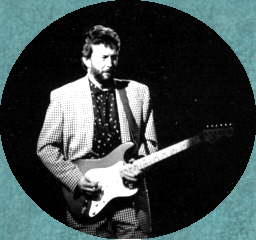

Eric
Clapton was one of England's most respected blues artists in the 1960s. The phrase
"Clapton Is God" was a familiar one in British blues circles. As a member of the
Yardbirds, then John Mayall's
Bluesbreakers, and finally Cream (one of rock's first supergroup), Clapton forged a bond
between blues and rock that remains strong today. In helping to create blues-rock, Eric
took the blues-induced rock guitar solo to new heights.
In 1963 Clapton joined his first band, the R&B-based Roosters. But
within a few months he moved to the pop group Casey Jones and the Engineers, and then to
the Yardbirds, with whom he stayed until 1965. By this time, Clapton had become a devoted
student of the three KINGS-B.B., Freddie, and Albert as well other major
bluesmen like Muddy Waters,
Little Walter, and Robert
Johnson.
Eric played on the Yardbirds' big 1965 hit "For Your Love".
Invited to join one of Britain's best blues bands, John Mayall's Bluesbreakers, Clapton
settled into a position where his deep interest in the blues could flourish. The classic
Bluesbreakers album released in 1966, Bluesbreakers-John Mayall with Eric Clapton ,
contained Clapton's now-classic renditions of Freddie King's "Hideaway," Otis Rush's "All of Your
Love," and Robert Johnson's "Ramblin' on My Mind." But Clapton soon outgrew
the Bluesbreakers and in 1966 he formed Cream with drummer Ginger Baker and bass player
Jack Bruce. The trio's repertoire contained a good portion of blues standards: Hambone
Willie Newbern's "Rollin' and Tumblin'," Albert King's "Born Under a Bad
Sign," Willie Dixon's
"Spoonful," and Robert Johnson's "Crossroads."
Despite Cream's success, the band broke up in late 1968. Clapton formed the
band Blind Faith with Baker, keyboards player Steve Winwood from Traffic, and bass player
Rick Grech the following year. One album and one tour later the short-lived Blind Faith
went the way of Cream.
Clapton played with John Lennon in his post- Beatles group the Plastic Ono
Band and with Delaney and Bonnie, the American R&B group that opened Blind Faith's
U.S. shows. Then, in 1970, he recorded his first solo album, Eric Clapton. On this
album, Eric, for the first time, not only played lead guitar but sang all the lead vocals.
The album produced the top- 20 single "After Midnight."
Some of Clapton's best blues guitar work was featured on the 1970 album Layla
and Other Love Songs, recorded by his new group, Derek and the Dominoes, which
included slide guitarist Duane Allman of the Allman Brothers Band. Songs such as
"Tell the Truth," "Have You Ever Loved a Woman," "Key to the
Highway," and "Layla" opened up a new dimension in blues-rock and proved
that Clapton was indeed a guitar genius.
Like Clapton's earlier bands, Derek and the Dominoes, was short-lived: Layla
was its only studio album. After a couple of live performances, Clapton returned to
England, where for two years he battled his heroin addiction. He resumed his solo career
in 1973, free of drugs and moving in the direction of pop and rock. Although nearly all of
his '70s and '80s solo albums contain a blues number or two, Clapton had all but abandoned
the blues as a recording artist. Live, however, he continued to spice his shows with blues
favorites like "Crossroads" and "Motherless Children," the hit off his
1974 solo effort 461 Ocean Boulevard.
In the late 1980s, Clapton's commitment to the blues was rekindled with the
rise in popularity of Stevie
Ray Vaughan and Robert Cray.
Clapton performed with Stevie Ray the night he was killed in a helicopter crash in 1990.
The year 1993 was a particularly special one for Clapton. He and his old
group Cream were inducted into the Rock & Roll Hall of Fame and his live album, Unplugged,
won six Grammy Awards.
Eric followed his multi-platinum triumph Unplugged with a new album
in 1994, entitled "From The Cradle". A return to his musical roots,
Clapton performed 16 blues classics-including works by Robert Johnson, Elmore James and
Willie Dixon. "This [album] is me in terms of my musical identity today-where I
came from and what I mean," says Clapton. "And wherever I go in the
future, it will be as a result of this."
Note: "From The Cradle" is one GREAT Blues Album ! (Webmaster)